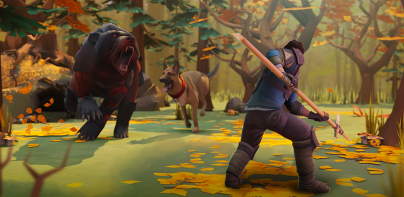


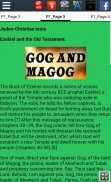
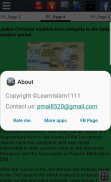
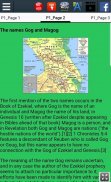
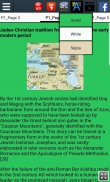


Gog and Magog

Descrizione di Gog and Magog
Gog and Magog are names that appear in the Hebrew Bible (Old Testament), the Book of Revelation and the Qur'an, sometimes indicating individuals and sometimes lands and peoples. Sometimes, but not always, they are connected with the end times, and the passages from the Book of Ezekiel and Revelation in particular have attracted attention for this reason.
From ancient times to the late Middle Ages, Gog and Magog were identified with Eurasian nomads such as the Khazars, Huns and Mongols and were conflated with various other legends concerning Alexander the Great, the Amazons, Red Jews, and the Ten Lost Tribes of Israel, while in Islam they were identified first with Turkic tribes from Central Asia and later with the Mongols. They became the subject of much fanciful literature, and in modern times they remain associated with apocalyptic thinking, especially in the United States and the Muslim world.
App Feature :
-Have 7 avalaible language English,Arab,Indon,Malay,French,Benggali,Russia and Turkish
Gog e Magog sono nomi che compaiono nella Bibbia ebraica (Antico Testamento), nel Libro dell'Apocalisse e nel Corano, a volte indicando individui e talvolta terre e popoli. A volte, ma non sempre, sono collegati ai tempi della fine, e i passaggi del Libro di Ezechiele e dell'Apocalisse in particolare hanno attirato l'attenzione per questo motivo.
Dall'antichità al tardo Medioevo, Gog e Magog furono identificati con nomadi eurasiatici come Khazar, Unni e Mongoli e si mescolarono con varie altre leggende riguardanti Alessandro Magno, le Amazzoni, gli ebrei rossi e le dieci tribù perdute di Israele , mentre nell'Islam sono stati identificati prima con le tribù turche dell'Asia centrale e successivamente con i mongoli. Sono diventati l'argomento di letteratura molto fantasiosa e nei tempi moderni rimangono associati al pensiero apocalittico, specialmente negli Stati Uniti e nel mondo musulmano.
Funzionalità dell'app:
-Hai 7 lingue disponibili: inglese, arabo, indon, malese, francese, benggali, russo e turco











